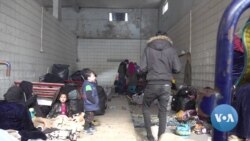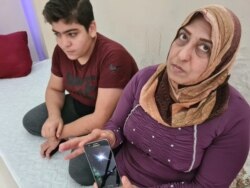Greece has been expelling refugees seeking a new life in Europe, forcing them to fend for themselves after abandoning them at sea, according to refugees interviewed by VOA and other media.
Since February, VOA has talked to scores of refugees in nearby Turkey who have tried to move to Greece but failed.
At that time, the Turkish government encouraged people to make the trip. But the Greek government told them not to come. Many refugees reported being beaten and robbed after they arrived, and then swiftly expelled.
In recent months, the stories have grown even more harrowing. Families tell us of being left at sea by Greek authorities on rubber boats without motors or fuel.
WATCH: Refugees Abandoned at Sea
Najma, 50, says she and her two sons made five attempts to cross the eastern Mediterranean to Greece. They had fled Syria after a bomb killed seven boys and men only meters away from Najma.
“I saw my neighbor pick her son’s heart out of the rubble,” Najma told VOA last week.
Najma says in their second attempt to cross, they made it as far as the Greek islands but were arrested and detained after they were caught camping at night. She says authorities brought them to sea and left them in small, tented orange lifeboats outside of Greek territorial waters.
These boats have no motors or fuel, and they have come to be known as “rescue islands.”
“They forced people onto the boat,” Najma said. “One woman fell onto her child. My son lost his glasses.”
Najma, like many refugees and other migrants in Turkey, said most of their phones were confiscated by Greek authorities, but one man had hidden his phone inside a blanket with his baby. He called the Turkish Coast Guard, which came to get them.
Turkey hosts more than 3.6 million refugees, with many families saying it is sometimes almost impossible to feed themselves or educate their children.
“My boys are smart,” said Najma. “I would sell my organs if it just meant they could go to school.”
Refugees caught in the middle
In February, Turkey ran a thinly veiled campaign to convince refugees to try to go to Greece.
The Turkish government bused some people to borders, published inflated numbers of the number of people able to cross into Greece and declared that Turkey’s border was open.
Tensions between Greece and Turkey are long held, and Greece responded by accusing Turkey of using refugees to force Europe into supporting Turkish President Recep Tayyip Erdoğan in Syria.
At the time, Turkey wanted Europe’s help fighting in Syria, as a Russian and Syrian government offensive pushed about a million people toward its borders. Turkey said Europe was not living up to its promise to assist in taking care of refugees and Erdogan declared the country was “opening the doors” for refugees to travel to Europe.
Greece responded by emphatically saying its borders were not open. Currently, tens of thousands of refugees are packed into squalid camps in Greece, some waiting months or even years before their asylum claims are processed.
But even when it became clear that Greece was not welcoming new refugees, people continued to flock to the land borders and seaside cities closest to Greece.
“My boys are smart,” explained Najma. “I would sell my organs if it just meant they could go to school.”
Greek response
From the first days of this new wave of travel, refugees were returning from Greece, sometimes only hours after crossing, missing documents, mobile phones, their money and sometimes even their shoes.
But it is only in recent months that reports of people being abandoned at sea have started to become common. In mid-August, The New York Times published an article saying it had documented more than 1,000 cases of people being “secretly expelled” from Greece.
The Greek government denied any illegal activity, noting it has also rescued tens of thousands of asylum seekers from the sea in recent years.
“Greece implements a tough but fair migration policy and fully respects its obligations under international law,” said Hellenic Minister of Migration & Asylum, Notis Mitarachi, in a press release.
Mitarachi did not immediately respond to a VOA request for further comment.
Terror at sea
For Najma and her family, the third attempt to cross into Greece was the most frightening.
She says they departed Turkey at night on a rubber boat about three weeks ago, but that Greek authorities caught them at sea.
“They circled around us until we were bailing water out with our hands,” Najma said. “I thought the children would drown.”
“Everyone was screaming,” added Mohammed, 14, “The Africans were screaming, the Arabs were screaming, the Afghans were screaming. Everyone.”
The noise quickly stopped when officers began poking their rubber boat with long, pointy curved picks, demanding quiet.
“I wasn’t scared until I thought they were going to rip open our boat,” said Ibrahim, 12.
Before the authorities departed, they pulled the rubber boat out of Greek territorial waters and confiscated the fuel. One passenger thought of this possibility and had a small supply of additional fuel hidden. They used it to get back to Turkey.
“We didn’t want to keep trying to get to Greece that night,” said Najma. “They already took our fuel, if they caught us again, maybe they would take our motor.”
Shadi Turk contributed to this report.








